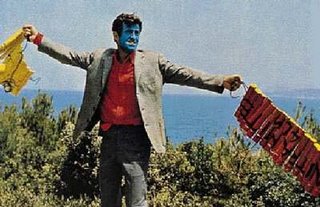Pauline Kael
Sitting down to dissect a Godard film is like trying to pick fly shit out of pepper with boxing gloves on.
Me
Seriously, when you start becoming a cinephile, you will run into Jean-Luc Godard pretty early on. He was one of the vanguards of the French New Wave, and his influence is immeasurable. He is, however, a tough nut to crack. He takes all your preconceived notions of what a movie should be, and tosses them out the window. I’ve seen most of the stuff from his great early period, and I’m mixed – There are films I like a lot – "Band of Outsiders", "Week-End", "My Life to Live", and " Les Carabiniers" - and ones I’m lukewarm to, like "Alphaville", and "Masculin-Feminin". The one that I keep going back to, however, is "Pierrot Le Fou", from 1966. Of all his stuff, I think this one is the most fun, and was made with the lightest touch.
The film opens with Jean-Paul Belmondo’s unemployed TV exec Ferdinand getting ready to go out to a party with his wife. On the way out, he meets a baby-sitter (Anna Karina) hired by his wife, and there is a small, yet noticeable recognition as they shake hands. More on that later. The party is Godard at his best. These people bore Ferdinand, and as he moves around the room, Godard has the characters talking in TV commercial blurps instead of conversational dialogue.
"The new Alfa-Romeo with its 4-wheel disc brakes"
"I use Odorono after my bath for all-day protection"
Ferdinand leaves, and goes home to find Marianne the sitter sleeping in a chair. He offers to drive her home, and here it’s revealed that the two have been in a relationship. The talk in the car, first with the camera on her as he speaks, then on him as she does, and they basically just run away together.
"It’s in this extended road trip that "PLF" really takes wing. The two wake up at her place, and as they talk, the camera pans past a dead body on a bed, and several machine guns laying about the place. These things aren’t remarked upon, but as they leave the narration goes into a fragmented call-and-respond mode between Ferdinand and Marianne. "This is a story" "All mixed up",etc. From these bits, we start to get an insight into Marianne. She has a brother Paul who is a gunrunner, and she is in some kind of trouble.
As the couple travels into southern France, the film starts to give the sense of being a story being invented, rather than a narrative of events. At one point Belmondo turns and talks directly to the camera. Karina asks him whom he is talking to, and he replies "The audience". Then there is the matter of his name. Marianne always calls him Pierrot, and he, without fail, responds "My name is Ferdinand." In several cases, the characters use the logic of movies, at one point Marianne even says "I saw this in Laurel and Hardy". There are references to "Johnny Guitar" and "Pepe Le Moko", and Sam Fuller even appears as himself at one point.
Godard could usually be counted on to include some kind of political diatribe in his films, which would often have the effect of grinding them to a halt. Think of the garbage men in "Week-End" or the blond firing squad victim in "Les Carabiniers". Here we get the Viet Nam war played as a short moneymaking skit by Ferdinand and Marianne for the benefit of some American servicemen. In this case, it works OK.
Marianne’s troubles eventually catch up to her. Ferdinand is surprised by a couple of hoods looking for her, and they resort to the most unusual mode of torture this side of Monty Python. Ferdinand is put in the bathtub, and they spray water in his face. It seems that Marianne has killed one of their colleagues (The guy on the bed!), and stolen money from them. He tells them where to find her.
 The concept of watching something that is just an artifice is brought home as we meet Paul, and realize that he’s not her brother at all, and that poor Ferdinand is just a rube. He gets his revenge in a finale that is arguably Godard’s best. Certainly, the most memorable image in "PLF" is of the deranged Ferdinand, face painted blue, waving dynamite in the air. He has decided to go out, literally, with a bang, and even lights the fuse. It’s somehow fitting that he changes his mind too late, as it burns down to nothing.
The concept of watching something that is just an artifice is brought home as we meet Paul, and realize that he’s not her brother at all, and that poor Ferdinand is just a rube. He gets his revenge in a finale that is arguably Godard’s best. Certainly, the most memorable image in "PLF" is of the deranged Ferdinand, face painted blue, waving dynamite in the air. He has decided to go out, literally, with a bang, and even lights the fuse. It’s somehow fitting that he changes his mind too late, as it burns down to nothing.
1 comment:
For shame! .... mentioning the brilliant Masculin feminin in the same sentence as Alphaville. And not a word about Prenom: Carmen.
Great site, by the way!
Post a Comment